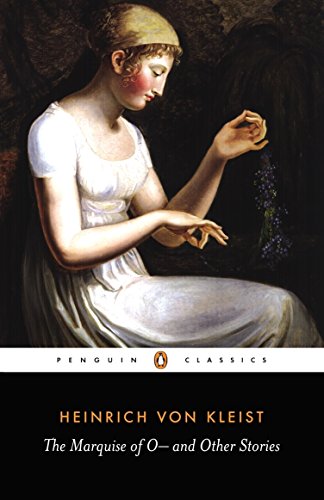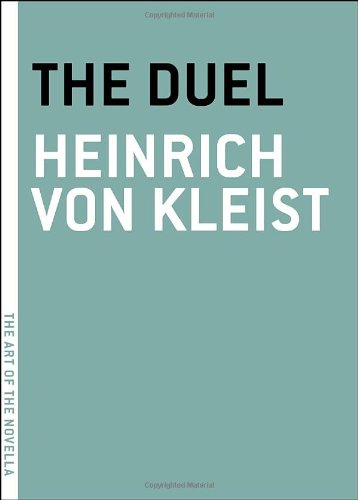Background
He was born at Frankfort in the Margraviate of Brandenburg (now Germany) on the 18th of October 1777.


(The late stories by an influential writer of singular tal...)
The late stories by an influential writer of singular talent Between 1799, when he left the Prussian Army, and his suicide in 1811, Kleist developed into a writer of unprecedented and tragically isolated genius. This collection of works from the last period of his life also includes 'The Earthquake in Chile,' 'Michael Kohlhaas,' 'The Beggarwoman of Locarno,' 'St. Cecilia or The Power of Music,' 'The Betrothal in Santo Domingo,' 'The Foundling,' and 'The Duel.' For more than seventy years, Penguin has been the leading publisher of classic literature in the English-speaking world. With more than 1,700 titles, Penguin Classics represents a global bookshelf of the best works throughout history and across genres and disciplines. Readers trust the series to provide authoritative texts enhanced by introductions and notes by distinguished scholars and contemporary authors, as well as up-to-date translations by award-winning translators.
http://www.amazon.com/gp/product/0140443592/?tag=2022091-20

(About This Book "No amount of wisdom could possibly make...)
About This Book "No amount of wisdom could possibly make sense of the mysterious verdict which God intended through this duel." A new translation of a key work by one of European literatures most important early writers. One of the few novellas written by the master German playwright, The Duel was considered by Thomas Mann and others to be one of the great works of German literature. The story of a virtuous woman slandered by a nobleman, it is a precise study of a subject that fascinated von Kleist: That people are sometimes seemingly punished for their very innocence. This Is A Melville House HybridBook HybridBooks are a union of print and electronic media: Purchasers of this print edition also receive Illuminationsadditional curated material that expand the world of Kleists novella through text and illustrationsat no additional charge. To obtain the Illuminations for The Duel by Heinrich von Kleist, simply scan the QR code (or follow a url) found at the back of the print book, which leads to a page where you can download a file for your preferred electronic reading device. "Illuminations" contains writings by Paul the Deacon - J.G. Millingen - Sir Walter Scott - Johann Ludwig Uhland - Miguel de Cervantes - Andrew Lang - John Carl Blankenagel - Louis and Regis Senac - Alfred Hutton - Fiore de Liberi and a collection of the twelve laws of chivalry. Illustrations include: Gerhard von Kugelgen - Johannes Gehrts - Jörg Breu Jüngere and Pauls Hector Mair - Achilles Emperaire - George Muhlberg and others. Also included is The Duelists Supplement The Art of Dueling: How To Shoot and Slash Your Way To Satisfaction which includes an entire facsimile scan of Fior de Liberi's Flower of Battle.
http://www.amazon.com/gp/product/1935554530/?tag=2022091-20
dramatist military novelist poet
He was born at Frankfort in the Margraviate of Brandenburg (now Germany) on the 18th of October 1777.
He studied law and philosophy at the Viadrina University of Frankfort.
In 1800 received a subordinate post in the ministry of finance at Berlin. After a scanty education, he entered the Prussian army in 1792, served in the Rhine campaign of 1796 and retired from the service in 1799 with the rank of lieutenant.
In the following year his roving, restless spirit got the better of him, and procuring a lengthened leave of absence he visited Paris and then settled in Switzerland. Here he found congenial friends in Heinrich Zschokke and Ludwig Friedrich August Wieland; and to them he read his first drama, a gloomy tragedy, Die Familie Schroffenstein (1803), originally entitled Die Familie Ghonorez.
In the autumn of 1802 Kleist returned to Germany; he visited Goethe, Schiller and Wieland in Weimar, stayed for a while in Leipzig and Dresden, again proceeded to Paris, and returning in 1804 to his post in Berlin was transferred to the Domdnenkammer (department for the administration of crown lands) at Konigsberg. On a journey to Dresden in 1807 Kleist was arrested by the French as a spy, and being sent to France was kept for six months a close prisoner at Chilons- sur-Marne. On regaining his liberty he proceeded to Dresden, where in conjunction with Adam Heinrich Mtiller (1779 - 1829) he published in 1808 the journal Phobus. In 1809 he went to Prague, and ultimately settled in Berlin, where he edited the Berliner Abendblätter.
Captivated by the intellectual and musical accomplishments of a certain Frau Henriette Vogel, Kleist, who was himself more disheartened and embittered than ever, agreed to do her bidding and die with her, carrying out this resolution by first shooting the lady and then himself on the shore of the Wannsee near Potsdam, on the 21th of November 1811.
In comedy, Kleist made a name with Der zerbrochene Krug (1811), while Amphitryon (1808), an adaptation of Moliere's comedy, is of less importance. Of Kleist's other dramas, Die Hermannschlacht (1809) is a dramatic treatment of an historical subject and is full of references to the political conditions of his own times. In it he gives vent to his hatred of his country's oppressors. This, together with the drama Prinz Friedrich von Hamburg, the latter accounted Kleist's best work, was first published by Ludwig Tieck in Kleists hinterlassene Schriften (1821). Robert Guiskard, a drama conceived on a grand plan, was left a fragment.
He also wrote some patriotic lyrics. His Gesammelte Schriften were published by Ludwig Tieck (3 vols. 1826) and by Julian Schmidt (new ed. 1874); also by F. Muncker (4 vols. 1882); by T. Zolling (4 vols. 1885); by K. Siegen, (4 vols. 1895); and in a critical edition by E. Schmidt (5 vols. 1904 - 1905). His Ausgewahlte Dramen were published by K. Siegen (Leipzig, 1877); and his letters were first published by E. von Billow, Heinrich von Kleists Leben und Briefe (1848).
He was by far the most important North German dramatist of the Romantic movement, and no other of the Romanticists approaches him in the energy with which he expresses patriotic indignation. Kleist is also famous for his essays on subjects of aesthetics and psychology. His notable works are The Marquise of O, Michael Kohlhaas, Penthesilea and others.
The Kleist Prize, a prestigious prize for German literature, is named after him.
(The late stories by an influential writer of singular tal...)
(Heinrich von Kleist has been universally recognized as on...)
(About This Book "No amount of wisdom could possibly make...)
Kleist's whole life was filled by a restless striving after ideal and illusory happiness, and this is largely reflected in his work.
von Kleist met Henriette Vogel in 1809 and a friendship flourished between them. The relationship between the two became more intimate in the autumn of 1811. According to their contemporaries, there was no fire of passion but a purely spiritual love.
